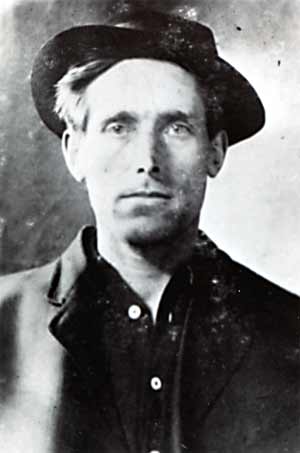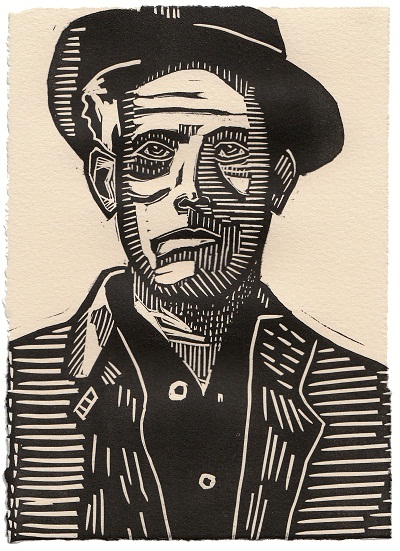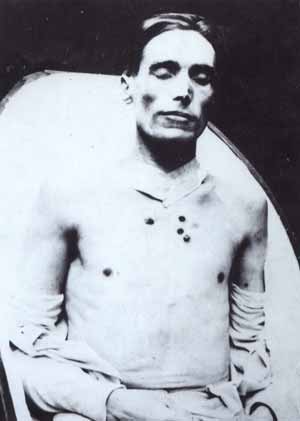<Back to Index>
- Mathematician Øystein Ore, 1899
- Composer Felix August Bernhard Draeseke, 1835
- Labor Activist Joel Emmanuel Hägglund (Joe Hill), 1879
PAGE SPONSOR



Joe Hill, born Joel Emmanuel Hägglund, and also known as Joseph Hillström (October 7, 1879 – November 19, 1915) was a Swedish - American labor activist, songwriter, and member of the Industrial Workers of the World (IWW, also known as the "Wobblies"). A native Swedish speaker, he learned English during the early 1900s, while looking for industrial jobs from New York to Los Angeles. Hill soon managed to become a well respected songwriter for the workers' association. His most famous songs include "The Preacher and the Slave", "The Tramp", "There is Power in the Union", "Rebel Girl", and "Casey Jones: Union Scab", which generally express the harsh but combative life of industrial workers. In 1914, wounded the same night of the assassinations of J.G. Morrison, a local notable, and his son, Hill was accused of their murders. Hill declined to give an alibi, explaining the wound as the consequence of a dispute over a woman. Commentators speculated that Hill declined to make public his love affair with a married woman, in order to avoid consequences to her. He was convicted in a controversial trial with changing testimony. Following an unsuccessful appeal, political debates, and international calls for clemency from high profile people and workers' associations, Hill was executed in November 1915. After his death, he was memorialized by several folk songs and has inspired books and poetry.
Hill was born 1879 in Gävle, a city in the province of Gästrikland, Sweden. He was the third child in a crowd of nine, where three children died in their youth. His father was named Olof, and was a conductor at Gefle Dala Järnväg, which is in the railroad business. Olof died at the age of 41, and his death resulted in an economic disaster for the family. His mother Margareta Catharina did however succeed to keep the family together, until she died in 1902. Joe Hill's house is still standing in Gävle, and is addressed at Nedre Bergsgatan 28, in Gamla Stan, the Old City. It is now a museum, and called Joe Hill - gården.
In 1902, when about 23, Joe Hill and his brother Paul emigrated to the United States where he became a migrant laborer, moving from New York City to Cleveland, Ohio, and eventually to the west coast. He was in San Francisco, California, at the time of the 1906 earthquake. Hill joined the Industrial Workers of the World (IWW) or Wobblies around 1910, when he was working on the docks in San Pedro, California. In late 1910 he wrote a letter to the IWW newspaper Industrial Worker, identifying himself as a member of the Portland, Oregon IWW local chapter.
Hill
rose in the IWW organization and traveled widely organizing workers
under the IWW banner, writing political songs and satirical poems, and
making speeches. His songs frequently appropriated familiar melodies
from songs of his time. He coined the phrase "pie in the sky", which appeared in his song "The Preacher and the Slave" (a parody of the hymn "In the Sweet Bye and Bye"). Other notable songs written by Hill include "The Tramp", "There is Power in the Union", "Rebel Girl", and "Casey Jones: Union Scab". As an itinerant worker,
Hill moved around the west, hopping freight trains, going from job to
job. Early 1914 found him working as a laborer at the Silver King Mine
in Park City, Utah, not far from Salt Lake City. On
January 10, 1914, John G. Morrison and his son Arling were killed in
their Salt Lake City butcher store by two armed intruders masked in red bandannas.
Arling had drawn a handgun from behind the counter and wounded one of
the masked men before being killed. The police first thought it was a
crime of revenge, for nothing had been stolen and the elder Morrison
had been a police officer, possibly creating many enemies. On
the same evening, Joe Hill appeared on the doorstep of a local doctor,
bearing a bullet wound. Hill said that he had been shot in an argument
over a woman, whom he refused to name. The doctor reported that Hill
was armed with a pistol. Considering
Morrison's past as a police officer, several men he had arrested were
at first considered suspects; 12 people were arrested in the case
before Hill was arrested and charged with the murder. A red bandanna
was found in Hill's room. The pistol purported to be in Hill's
possession at the doctor's office was not found. Hill
resolutely denied that he was involved in the robbery and killing of
Morrison. He said that when he was shot, his hands were over his head,
and the bullet hole in his coat — four inches below the bullet wound in
his back — seemed to support this claim. Hill did not testify at his
trial, but his lawyers pointed out that four other people were treated
for bullet wounds in Salt Lake City that same night, and that the lack
of robbery and Hill's unfamiliarity with Morrison left him with no
motive. The
prosecution, for its part, produced a dozen eyewitnesses who said that
the killer resembled Hill, including 13 year old Merlin Morrison, the
victims' son and brother, who said "That's not him at all" upon first
seeing Hill, but later identified him as the murderer. The jury took
just a few hours to find him guilty of murder. A widely circulated story, which was included in the 1971 movie Joe Hill, is that Hill was in bed with a married woman on the night of the murder. He refused to use this iron clad alibi,
because in Utah in 1914, it would have ruined her reputation and her
life. His discretion ended his life. The story is the basis of several
songs and at least one film. An appeal to the Utah Supreme Court was unsuccessful. Orrin N. Hilton,
the lawyer representing Hill during the appeal, declared: "The main
thing the state had on Hill was that he was an IWW and therefore sure
to be guilty. Hill tried to keep the IWW out of [the trial]... but the
press fastened it upon him."
In
a letter to the court, Hill continued to deny that the state had a
right to inquire into the origins of his wound, leaving little doubt
that the judges would affirm the conviction. Chief Justice Daniel
Straup wrote that his unexplained wound was "a distinguishing mark,"
and that "the defendant may not avoid the natural and reasonable
inferences of remaining silent." In an article for the socialist newspaper Appeal to Reason,
Hill wrote: "Owing to the prominence of Mr Morrison, there had to be a
'goat' [scapegoat] and the undersigned being, as they thought, a
friendless tramp, a Swede, and worst of all, an IWW, had no right to
live anyway, and was therefore duly selected to be 'the goat'." The case turned into a major media event. President Woodrow Wilson, the blind and deaf author Helen Keller,
and people in Sweden all became involved in a bid for clemency. It
generated international union attention, and critics charged that the
trial and conviction were unfair. Hill was executed by firing squad on November 19, 1915, and his last word was "Fire!" Just prior to his execution, he had written to Bill Haywood,
an IWW leader, saying, "Goodbye Bill. I die like a true blue rebel.
Don't waste any time in mourning. Organize... Could you arrange to have
my body hauled to the state line to be buried? I don't want to be found
dead in Utah." His last will, which was eventually set to music by Ethel Raim, founder of the group The Pennywhistlers, reads: My will is easy to decide, To commemorate the 50th anniversary of the execution of Joe Hill, Philip S. Foner published a book, The Case of Joe Hill, about the trial and subsequent events, which concludes that the case was a miscarriage of justice.
Hill's body was sent to
Chicago where it was cremated. His ashes were purportedly sent to every IWW local.
("every state but Utah," according to the AFL - CIO biography, "as well
as to supporters in every inhabited continent on the globe. According
to one of Hill's Wobbly songwriter colleagues, Ralph Chaplin, all the
envelopes were opened on May 1, 1916, and their contents scattered to
the winds") In 1988 it was discovered that an envelope had been seized by the United States Postal Service in 1917 because of its "subversive potential". The envelope, with a photo affixed, captioned, "Joe Hill murdered by the capitalist class, Nov. 19, 1915," as well as its contents, was deposited at the National Archives. A story appeared in the United Auto Workers' magazine Solidarity and a small item followed it in The New Yorker Magazine. Members of the IWW in Chicago quickly laid claim to the contents of the envelope. After
some negotiations, the last of Hill's ashes (but not the envelope that
contained them) was turned over to the IWW in 1988. The weekly In These Times ran
notice of the ashes and invited readers to suggest what should be done
with them. Suggestions varied from enshrining them at the AFL - CIO headquarters in Washington, DC to Abbie Hoffman's suggestion that they be eaten by today's "Joe Hills" like Billy Bragg and Michelle Shocked.
Bragg did indeed swallow a small bit of the ashes and still carries
Shocked's share for the eventual completion of Hoffman's last prank. The majority of the ashes were cast to the wind in the US, Canada, Sweden, Australia, and Nicaragua. The ashes sent to Sweden were only partly cast to the wind. The main part was interred in the wall of a union office in Landskrona,
a minor city in the south of the country, with a plaque commemorating
Hill. That room is now the reading room of the local city library. One small packet of ashes was scattered at a 1989 ceremony which unveiled a monument to IWW coal miners buried in Lafayette, Colorado. Six unarmed strikers were machine gunned by Colorado state police in 1927 in the Columbine Mine Massacre. Until 1989 the graves of five of these men were unmarked. Another famous Wobbly, Carlos Cortez, scattered Joe Hill's ashes on the graves at the commemoration.
For there is nothing to divide.
My kin don't need to fuss and moan,
"Moss does not cling to a rolling stone."
My body? Oh, if I could choose
I would to ashes it reduce,
And let the merry breezes blow,
My dust to where some flowers grow.
Perhaps some fading flower then
Would come to life and bloom again.
This is my Last and final Will.
Good Luck to All of you,
Joe Hill